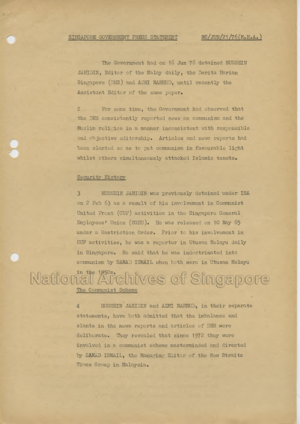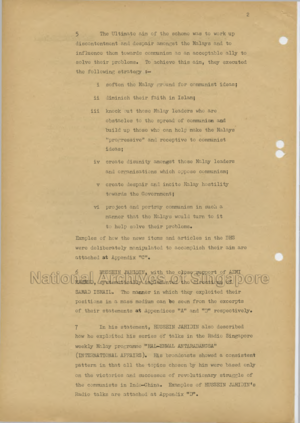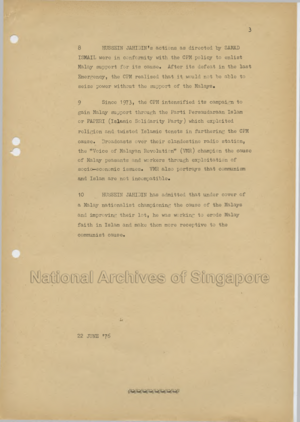Jadual Kandungan
Penangkapan Wartawan (1976)
Dirujuk oleh
Ringkasan Peristiwa



Sumber asal pernyataan Kementerian Ehwal Dalam Negeri Singapura yang dirujuk dalam laporan ini: MINISTRY OF CULTURE, 22/6/1976: |"THE DETENTION OF HUSSEIN JAHIDIN AND AZMI MAHMUD, EDITOR AND ASSISTANT EDITOR OF THE MALAY DAILY BERITA HARIAN SINGAPORE (BHS) ON 16 JUN 76".
Mantan Perdana Menteri Singapura, Lee Kuan Yew, turut merakamkan sedikit latar peristiwa ini di dalam memoir beliau: “A few weeks after (Tun) Razak’s funeral, he (Tun Hussein Onn) visited Singapore, saying he wanted to establish good personal relations and be able to discuss and overcome bilateral problems. We had a one-on-one meeting. I told him my fears of Malay communists and their sympathisers penetrating Malaysia’s mass media and their radical Malay student and trade union leadership. We talked freely and frankly about the Malay communist infiltration of his media, including the activities of Samad Ismail, an MCP member from his time in Singapore in the 1950s, and his group. When Razak was prime minister, Samad had worked his way into UMNO and become a powerful figure in the New Straits Times and Berita Harian, building up a coterie of supporters. Hussein agreed this was a danger but said that the communists and student radicals could not be arrested without upsetting the Malay ground. Later, in June 1976, the ISD arrested one of Samad’s disciples in Singapore, Hussein Jahidin, a Berita Harian editor. He implicated Samad and several other Malay journalists in Kuala Lumpur as pro-communists. The Malaysian Special Branch arrested Samad and his Kuala Lumpur group. Hussein Onn had had the courage to act against a pro-communist Malay intelligentsia although this was likely to cost him some support.” (Lee Kuan Yew, 2012: |"From Third World to First: The Singapore Story, 1965-2000", m.s. 245-246).
Pengakuan Para Tahanan
Peristiwa selanjutnya: “In a series of public talks over the radio in 1961, entitled 'The Battle for Merger', Lee (Kuan Yew) repeatedly alleged that (A) Samad (Ismail) (using his MNP code name Zainal backwards), was a communist and connected to the Malayan Communist party. The then general manager Of the Straits Times press in Kuala Lumpur, A. C. Simmons, also confirmed that he was under pressure from 'certain Singaporeans' to sack Samad from Berita Harian. Much to Lee's annoyance, the campaign to tarnish Samad proved ineffectual. This was demonstrated by Samad's rapid rise within the ranks of the Straits Times in Kuala Lumpur, and his growing influence within leftist UMNO circles close to Tunku's successor, Tun Razak. Indeed, Samad and other former PAP stalwarts who had relocated to Kuala Lumpur, such as James Puthucheary, were advising the Alliance leadership on rehabilitating Malaya's pro-Western image within the Afro-Asian bloc. Samad and Puthucheary were regularly included in Malayan delegations to Afro-Asian solidarity conferences in the mid-1960s. However, Samad's insider status within UMNO circles was short-circuited by the 1976 'confession' of ISA detainee Hussein Jahidin, a Singaporean Berita Harian editor and former Utusan journalist. Inter alia, Hussein had 'confessed' that Samad and other senior Malaysian newspapermen were communists. Shortly after, Samad and other supposed communists were detained under the ISA in Malaysia. Satisfied by the Malaysian government's swift clampdown against Samad and other 'communists', Lee noted in his memoirs that “Hussein Onn has the courage to act against a pro-communist Malaysian intelligentsia”. (Lily Zubaidah Rahim: “Winning and Losing Malay Support: PAP-Malay Community Relations, 1950s and 1960s”, disunting oleh Michael D. Barr, Carl A. Trocki: 2008: Paths Not Taken: Political Pluralism in Post-War Singapore, m.s.100-101).
Menurut beberapa sumber lain, pernyataan pengakuan serta wawancara ini adalah berunsur paksaan, ketika berada di dalam tahanan ISA:-
- “Further arrests of journalists took place in 1976-77 following the forced withdrawal of Singapore's People's Action Party (PAP) from the Socialist International. In June 1976 Hussein Jahidin and Azmi Mahmud of the Berita Harian Singapore were detained under the ISA. Within a short period both made 'confessions' that they had attempted to slant the news in their journal in a manner critical of the Government. Their arrest was followed in February 1977 by that of Arun Senkuttuvan, Singapore correspondent of the Economist and the Financial Times. Some weeks later the arrest took place of the correspondent of the Far Eastern Economic Review in Singapore, Ho Kwon Ping. Lawyers who have sought to interview clients who are political detainees have frequently found themselves requested by the security authorities to specify in advance those matters which they wish to discuss with their clients. When interviews do take place between lawyers and their clients these communications are never private but in fact take place via monitored telephone calls through a glass partition. During the initial 30 days' interrogation that all political detainees are subjected to, they are invariably refused access to a lawyer. In Amnesty International's experience, this greatly increases the likelihood of ill-treatment and torture of detainees.
Both journalists made televized 'confessions' within a month of their detention acknowledging government accusations that they had sought to defame the Government of Singapore by their reports. The editors of both the Financial Times and the Far Eastern Economic Review issued categorical statements that there was no cause for suspicion that the journalists had written in a slanted fashion and placing the 'confessions' in the context of continuous interrogation and the prospect of indefinite detention under the ISA. Both men were released on 29 April 1977. Arun Senkuttuvan was deprived of his citizenship while in detention.”
(Sumber: |REPORT OF AMNESTY INTERNATIONAL MISSION TO SINGAPORE - 30 November to 5 December 1978, m.s. 42). Sumber lain: Cherian George, 2012: |FREEDOM FROM THE PRESS: Journalism and State Power in Singapore (PDF), m.s.103-104.
- “Shock and disbelief again seemed to be the reaction of some of the press for many weeks after the arrests. The Malaysian and Singaporean newspapers, of course, lent full support to their governments, but the Hong Kong Standard and Bangkok Post called for an open trial, and the Press Foundation of Asia requested a ' high-level judicial enquiry' to ensure that ' there is no miscarriage of justice or, as feared by some, a deliberate frameup by some interested parties'. The London Times, featuring Samad in its 'Prisoners of Conscience' column, questioned Samad's masterminding of distortion in Berita Harian Singapore, stating: “This allegation apparently takes no account of the fact that Mr Ismail relinquished control of the Singapore editorial policy of Berita Harian some four years ago. Especially dubious were FEER correspondents in Malaysia and Singapore. For example, K. Das pointed out that the seven-paragraph press release announcing the arrests of Samad and Samani did not name specific action, citing place and time, but did remind readers that Samad, a card-carrying communist in 1951 when he was arrested by the British in Singapore, had not disavowed his adherence to communism upon his 1953 release. Das wondered why Samad, under close scrutiny since his migration to Malaysia in 1959, would be given the Literary Pioneer Award just a month before his arrest if he was a known communist campaigner. Das added that he did not believe security had borne so many fruits in such a short time after he won the literary prize; he thought the whole episode was linked with revelations made in Singapore. He showed that the Singapore Home Ministry statement on Hussein and Azmi, although somewhat more specific, also lacked names and places, adding that the Singapore confessions wrapped up the Malaysian case against Samad - a case that made a good example of the government's promise to seek out subversives no matter how important they are.” (John A. Lent, 1978: |"True (?) Confessions - TV in Malaysia and Singapore").
- Perkongsian pengalaman serta perspektif anak A Samad Ismail, Nuraina, mengenai peristiwa ini:-
- 13/2/2007: |"Tuesdays With Bapak (1)"
- 20/2/2007: |"Tuesdays With Bapak (2)"
- 27/2/2007: |"Tuesdays With Bapak (3)"
- Aidila Razak, 29/3/2012: |"This is the communist's daughter!"
Pengakuan penting: Kami bukan ahli sejarah! Sila klik di sini untuk penjelasan lanjut.
